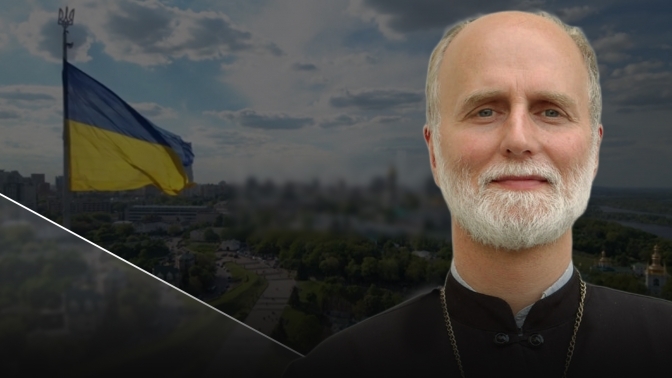
Bishop Gudziak: Ukrainians were fated to cure Russia from pathology
[For urgent updates please follow Ukrainian Freedom News on Telegram]
We pondered which title to give for this conversation, and we thought that it could be presented something like «How to rebuild a native house», so that it echoes the treatise of the most famous Greek Catholic Metropolitan of the XX century, Andrey Sheptytskyi. We know that the Metropolitan has practical advice on what Ukrainians should do. This is the thesis that Ukrainians should achieve «permanent happiness», the thesis about unity, examples of which we see in Ukraine today, and the thesis about protection from external borders, which we also observe in Ukraine. Does this mean that this treatise is relevant for our time?
Both this treatise and the figure of Metropolitan Andrey in general are only being discovered by Ukraine. He may be a little known in Lviv, in Galicia, but he is a figure who is just becoming known in the east and in the center of Ukraine. In my opinion, this is the greatest Ukrainian figure of the 20th century. He was a deep thinker who came through various challenges. He experienced seven different countries and occupations during his 44 years of service as the head of our Church. But, what is more important, on the territory where he served, his traces remain – they are so deep and beautiful. You can talk about Sheptytskyi with other peoples and other denominations, and therefore his thoughts, his position on socio-political issues will be life-giving in the future.
For many people, this war was a shock. They did not believe that it could begin. But there was an occupation in the east and south of Ukraine, and now no one can say that Russia is not the occupier. Were you surprised that this war started? What is this war about?
I was shocked, but not catched unexpectedly. It was no surprise, but it shocked me and everyone. I was in Paris on the 24th, but already on the 21st, after Putin’s speech, it was clear where it was all going. The next day, the declaration of acknowledging the «L/DNR» took place, these intentions were quite explicit, especially since the intelligence of various countries said that war was inevitable. Myths are finally being developed. The countries that abandoned the colonial heritage and now struggle with its consequences, with racism, with the marginalization of certain ethnic groups, did not add that Russia is a colonial state with an imperial identity that wants to restore its imperial power. Russia is not a country with an advanced economy and in many indicators was far behind other developed countries, but its scale is 11 time zones.
Russia is 28 times larger than Ukraine, and this created the impression of an empire among Russians. The Russians, led by Putin, are acting imperially. Empires need colonies, colonies need subordinate slaves, and we, Ukrainians, should be subordinates, or even slaves. And Ukrainians say «no». I explain in America: do you imagine that the States would again become a colony of England, or Algeria of France, or Colombia of Spain? It’s in the past, it’s the end, and the Ukrainians have said «full stop»: we will not return to this, we will not be second-rate servants to other masters. Russia should become a normal state. Let it be great, but it must become a country that respects others.
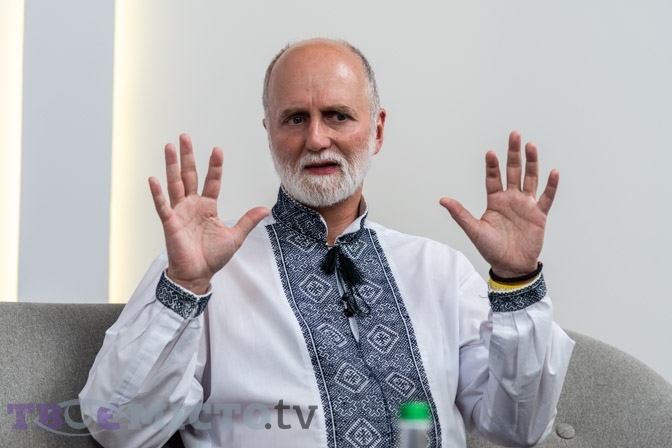
In Paris, we discussed the topics of cohabitation of neighbours. Near Paris, there are places marked by the horrors of the Franco-German wars, such as Verdun, where 850,000 soldiers on both sides were killed, missing or maimed in 300 days. This is almost three thousand per day. But the French and the Germans, led by de Gaulle and Adenauer, met on the banks of the Reims River and came to a joint conclusion that it was necessary to change the fact that every few decades a brutal war was waged between the Germans and the French. They were both Christians, Catholics, they met at a mass in the Reims cathedral, where Ujrainian princess of XI cnntury, Anna Yaroslavna, was married. And we see that for a long time, the last sixty years since then, there has been no major war between these countries. This is a great achievement of the European Union. And we started a conversation with the Europeans in Paris, which was perhaps premature, not everyone understood that Ukrainians must influence Russia, because we cannot move to South America or North America, but are doomed to have Russians as neighbours.
And as long as they have this vision – that «Ukraine is ours», we will not have peace. Today, it is important that other countries and peoples know what Russia is, how dangerous it is for its immediate neighbours and the world as a whole, and how much it must change so that danger and harm become a thing of the past.
Pope Francis plans to visit Moscow with some attempt at dialogue. No pope had been to Moscow before him. This will be a precedent. Many Ukrainians do not understand the Pope’s intentions, and now we have questions about whether Russia is a civilized country in general, or whether it is an uncertain barbarian country that has only a «thin facade» of imitation of European culture. The Moscow Patriarchate is a cult, but to what extent are they Christians not in letter, but in spirit?
Nowadays, Russia is acting in a barbaric way. Command issues orders that are barbaric. Bombing, shelling of the residential buildings with missiles, attacking places where civilians live and work. This is state terrorism, which is equal to barbarism. And, unfortunately, such actions of the government and the army have a lot of support in society. 700 rectors of higher educational institutions signed a statement in support of this war. Not a single bishop, and there are almost three hundred of them in Russia, spoke clearly against the war. And in the Russian Orthodox Church, where, I think, there are about 25 thousand clerics – priests, deacons, only 293 signed a such anti-war statement. That is, approximately one percent.
So, unfortunately, this society is sick, it has a pathological defect. How it will happen, whether the pope’s contacts with the Russians in Russia can affect it, time will show it. But everyone interested in this problem should understand that we are dealing with a moral disease that simply cannot be cured...
I once read a post where you dissected an article about the Beatles song Imagine. Did they influence you? After all, Imagine is not just a song, it is a manifesto of that generation. There’s a lot of stuff out there that buy our attention – «let’s just not fight, let’s just be nice.» And you say in the article that everything is more complicated. Voicing the doubts that Ukrainian society puts forward to the Pope, do you wonder if he is perhaps not promoting the Lennon version, or, on the contrary, is looking at everything from the standpoint of eternity and sees deeper and more than we do?
The Pope is not a naive pacifist. Fron the other parts of the globe are difficult to see in detail and understand the problems of Eastern Europe and Russia. I think he is guided by evangelical truths and grows in understanding, because his rhetoric becomes clearer in the condemnation of atrocities. I think the pope understands that sin is behind it. Lennon is the 60s, when the word «sin» disappeared from public rhetoric, as if it did not exist. Whereas war is perhaps the greatest sin. A great violation of God’s will and a great offense to one’s neighbor. War violates almost all of God’s laws, maims life and sometimes takes the lives of millions.
And the paradox is that the Russian church leadership, at least at the level of public statements and sermons, supports this sin. How to get them to change this behavior, to change this way of thinking, is difficult to imagine, but sooner or later it has to happen. For example, no one could imagine that the Germans would go the way they did in the 30s. The Germans themselves in 1940 could not imagine what awaited them in 1944 and 1945. In the end, Germany remains in a position of remorse and attempts to understand how this could happen in a civilization that has developed sciences, Nobel laureates, literature, art, and classical music. And here is such a terrible chauvinistic ideology, which will probably forever remain a stain on German historical memory and identity.
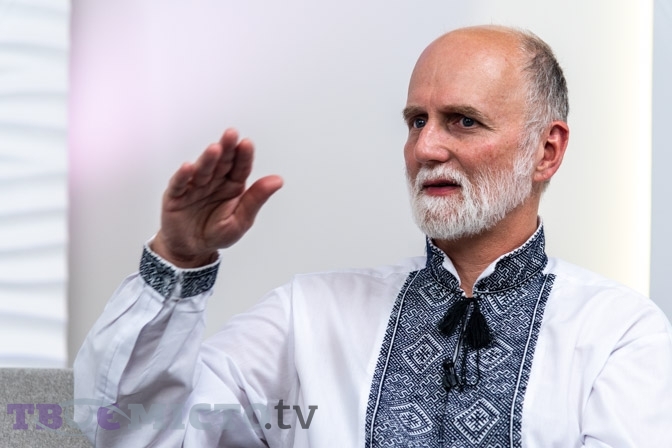
It seems to me that this will happen to Russia as well, because even past events, what happened in the 20th century, have not yet been properly assessed. The Nuremberg trial took place against the Nazis, but something similar did not happen against the Communists. And communism has terrible consequences. And the fact that today in no university, no cultural institution, and political life in free countries one can hint at Nazism, but one still can be a communist, promote communist ideas, shows that this assessment is still ahead.
In Russia, this is not only a philosophical and political ideology, but also a question of identity. In their national identity, the wrong of others is coded, because this identity must prevail. This is deeply contrary to God’s calling. In general, the rules of the game to which man is called derive from God’s identity. There are three persons in God who serve one another. There is no domination, but there is giving, there is a gift, and we are called to live by giving. Instead, Datel, the all-giving God who gave Adam paradise, was met with the response of Adam, who takes, seizes. God tells Adam «don’t eat this vegetable or you will die». Adam kills himself by rapture. And this is the nature of sin. And the Russian imperial identity is like that.
This war is a fascination. Sometimes such empires, such concessions last for centuries, but they still have to fall apart. We are just now beginning to understand that most of the monuments in Europe are to people who killed people. In one survey conducted in Kyiv, I was asked to name the five greatest heroes of Ukrainian history. And when I named them, I was asked about the criteria. I replied that the first criterion for me was that their legacy was not that they killed people. As if something simple, as if it were the main commandment of God, but this is a matter of admiration, conquest is heroized, and in Russian history this happens painfully. Imagine that Russians have as heroes people who destroyed millions of Russians themselves. This is some kind of historical masochism. It seems to me that, unfortunately for Ukraine, Ukrainians are destined to cure Russia of this pathology.
If we talk about the USSR, which was a modification of the Russian Empire, there is such a study by Vladimir Lefebvre, who emigrated from Russia to the United States and became a professor of sociology in California, being a mathematician. He compared large groups of immigrants from the Soviet Union to large groups of Native Americans. He was interested in finding their difference, he called it the «algebra of conscience» and came to the conclusion that what distinguishes them most is that people from the Soviet Union tolerated lies, if these lies could be interpreted «for good». For example, there was a question: if your close relative has the fourth stage of cancer, should he be told about it? The Americans answered that it was necessary, because a person can spend the days he has left with this in mind, and the people from the Union answered that no, definitely not, let him enjoy a few weeks in ignorance. It seems to me that in Ukrainian politics for 30 years of independence there is only one taboo: not to tell the truth to the end. And the most interesting thing is that the voter tolerates and accepts it. Will the Ukrainian change because of the war and is it necessary for the Ukrainian to change?
Without a doubt, we have seen various troubles in our society, the impoverishment of Ukraine, despite the resources and high education of Ukrainians, despite the predictions in the late 1980s and 1990s that Ukraine has all the data to become a leading economy. But untruth, double bottom, corruption, mutual deception – all this strengthens the syndrome of mistrust. And mistrust creates barriers in relationships, communication, starting with the family, in the community, at work, in the city, in the country. And the reason for this is trauma.
The Ukrainian people are deeply traumatized, and this trauma is transgenerational, not fully named, not fully understood, not to mention the fact that it has not been healed. And healing requires truth, love, and great patience. There is an accumulation of past traumas that make us mistrustful of each other. This mistrust awakens in us reflexes of protection, which often takes the form of a mask, a facade, a wall. In the worst case, this fear causes aggression in us.
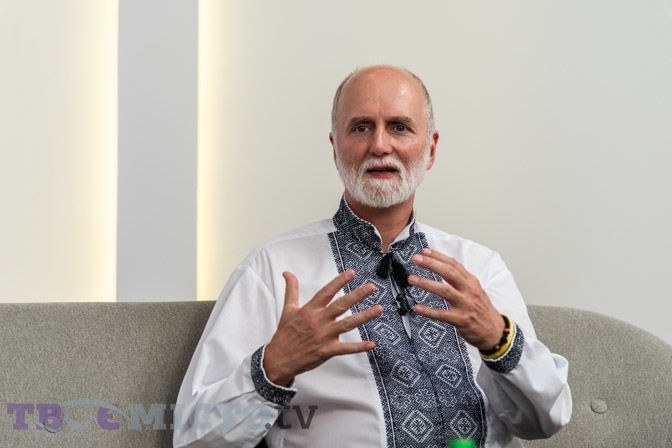
I think that during the years of the war, especially in its last active months, Ukrainians heal through painful experiences, but also through the testimony of «I am ready to lose everything for you.» Those who sacrifice themselves for a relationship out of love, those who give their lives for you and me, prompt us to reconsider. This process is not linear, direct, it has deviations. But I would like us to be in it. However, success is not guaranteed. First, there is a rise, an elevation.
Today’s Ukrainian society is more united than ever before and thinks in a similar way. Ukraine pushed for the unification of Europe, which was going through deep cracks, Brexit happened, other countries questioned their membership in the EU, and then suddenly the EU got stronger.
The North Atlantic Alliance is stronger than ever before, new states are joining it, and in various countries the world’s attention is drawn to what Ukrainians do, how they live and give their lives. This is all at the level of high moral principles. And it is important that we do not lower this bar.
Observing what was happening, we admire the leadership qualities that Zelenskyi unexpectedly showed, we admire Valerii Zaluzhnyi, who demonstrates how to successfully oppose a huge army. You also talked a lot about the fact that Ukraine lacks leaders. And really, we would like such useful people in every field of life. What should leaders be and what qualities do we lack?
I do not know Zaluzhnyi closely. Of course, there is great respect for him, and even more so for our entire army. There is admiration for President Zelensky in the world. I think that Ukrainians are also grateful to him for the communication of the last months. I try to emphasize that the leader in relation to Zelenskyi was the Ukrainian people. There were many people who professed the principles that Zelensky grew up with and, thank God, grew up to become their effective communicator. More than one Ukrainian had many questions about the president’s statements. Today, he will no longer say «what is a difference?», because these things are fundamentally important.
Once [Ukrainian Greek Catholic Archbishop] Lubomyr, who was a source of wisdom for all of us, speaking about the shortcomings of different persons or different categories of leaders, including in the Church, said: «Let people grow in their freedom.» I’m glad that the president has grown up, but the fact is that in the last days, in the last weeks before the invasion, he denied that there was going to be a war. He was wrong. Perhaps behind this was the desire not to sow panic, but there are analysts who said that it was necessary to prepare earlier. In other words, this war is being waged by the entire nation. And Zelenskyi now represents these people. But I am very afraid of creating an idol, they say, if something happens to Zelenskyi, it is not known what will happen to Ukrainians. It will be a colossal loss, and the Russians will do everything they can to make him the first on the list to be destroyed, as well as, ultimately, His Beatitude Sviatoslav, other persons who lead and lead us politically, morally or spiritually.
We are gradually moving away from the idea that some «father king» will save us. The Orange Revolution took place, Yushchenko won, and people went home with the hope that everything was settled, that everything would be fine from now on. But it’s not so. We have to work every day, each of us.
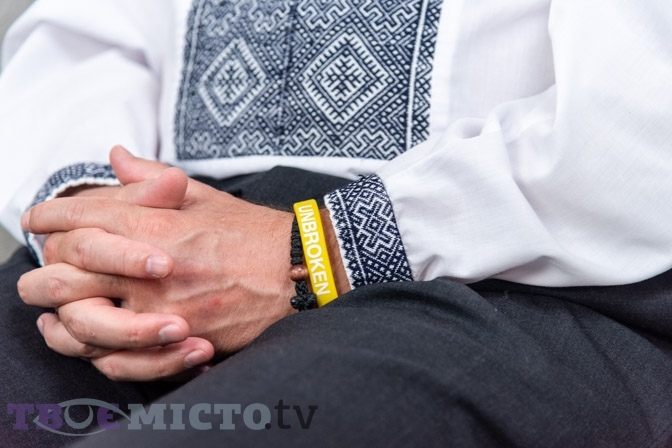
I had a conversation with UCU employees and talked about the cleaners. You can be great at cleaning. It’s a completely different feeling when you enter a room where there are big cleaners, people who believe that in their life, in this space, they will do their best. There are professors at UCU, there are priests, there are students, but there is also a technical personnel, and all of them are called to a high level of performance of their duties.
It seems to me that we are on a pilgrimage of responsibility, which manifests itself in a special way and which captivates the whole world. Because when the war started in 2014, the whole society started sewing socks, looking for ways to support the army, which formally numbered 150,000 at the time, and only 10,000 were combat-ready.
Society was shaken, students, children said «we have to do something», and Ukrainians were rebuilding this army. Obviously, prominent politicians and President Poroshenko played a role, but this process continues. Now, wherever I go in Ukraine, I see an incredible feat, and it’s not a day or a week, it’s already the fifth month that people are doing something to help, for example, refugees, accepting someone. I do not canonize everyone, but the fact that Ukrainians accepted six or seven million internally displaced people is admirable. This is not a country filled with refugee camps. There are some in Sykhiv or in Stryiskyi Park in Lviv, other cities, but many people have accepted the displaced people in their homes. We are very grateful to the Poles, who accepted 3.8 million Ukrainians, two million remain there. And this is a network reality that does not wait for a command from above. I believe that this is a positive sign. May God grant us to endure mutual responsibility and solidarity.
Patriarch Joseph the Blind seems to have said: «I will be great if you are great.» The answer to the great challenges of the people is formed including the leader, at least the one who is in charge. That is, leadership is primarily local leadership?
There are many types of leadership. First, there is good leadership and bad leadership. There are many examples of bad leadership that is comforted by power and money. Putin is a terrible leader, he is leading Russia to the moral bottom just like Hitler did. Maybe not in the same way, but by analogy. Ukraine and the world need leaders who serve, not for themselves, not for a pedestal and glory, «because I trampled, because I humped», but leaders who give life, who pay attention to the poor, marginalized, offended, who not only smile upon those who are useful, but serve those who are destitute. And we need such leaders at every level: in small communities, in business, in journalism, in the church and parishes. At the levels of regions and countries. And we see how there is a lack of prominent leaders who attract attention and respect.
I don’t know how many Europeans can name the Prime Minister of Spain, for example, or the President of Bolivia. The world is big, complex, and we find it difficult to embrace it with our consciousness. But today, those with the people will remain in memory and history. And here are Zelenskyi’s achievements, for which he is respected even by those who did not vote for him, that he is where the people are, that he did not run away. After the victory, the Ukrainian government will have an opportunity to develop, and then we will see whether it will serve or not be tempted by the «for itself» reflex.
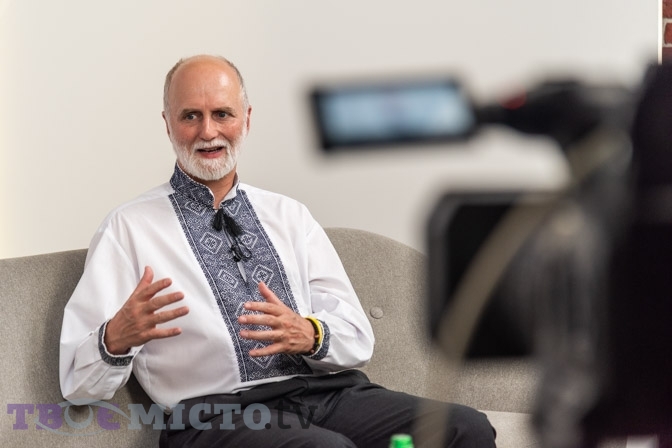
Can leadership be imported in conditions of scarcity? We saw attempts in 2014, sometimes successful, to attract foreign specialists who helped to make quick decisions in the economy. For example, Natalia Yaresko, who did a fantastic job... The question is, for example, would you, as a leader and manager who built a successful institution – UCU, be able to do it without being a person who was formed and grew up outside of Ukraine?
Undoubtedly, certain life experiences, the freedom to which my parents fled in 1944, certain schools, the opportunity to live in the same house for three years with Patriarch Joseph – all this had an impact, gave certain opportunities. After all, Lyubomyr Huzar, Myroslav-Ivan Lyubachivskyi, Bishop Mudryi, Father Mykhailo Dymyd, Bohdan Troyanovskyi, who founded printing house «Svichado», Marta Kolomiets, who initiated many things in Kyiv. There were many people from the diaspora, imported in some geographical sense. But if you look at cultural connections, I learned English all the way to school. That is, my first five or six years were Ukrainian-speaking, with Ukrainian cuisine, Galician church and so on. My parents did not isolate us, did not keep us in a «bubble». We were becoming full members of the local community, but it wasn’t either/or, it was both/and. After all, then I lived in Italy, Poland, had some Soviet experience: I did an internship in Kyiv in 1988.
But it is impossible to do something in Ukraine for Ukrainians without Ukrainians. The trick is to find a formula and balance in this. It is not only about production in order to have a product and wealth. The most important thing is trust.
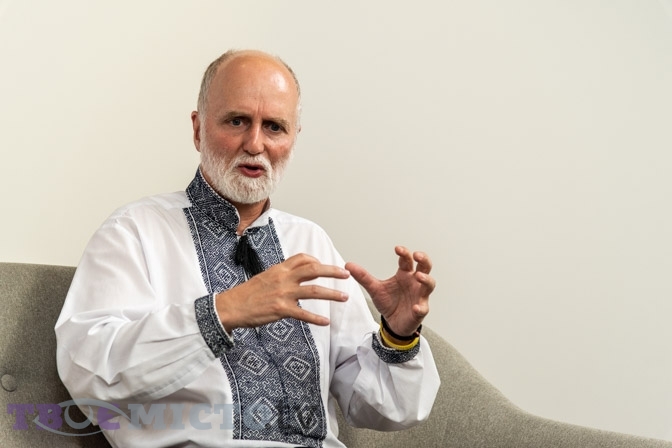
It seems to me that one of the most important things in UCU, apart from spiritual principles, is the way of making decisions. Decisions are consensual at UCU. I was rector for 13 years, and there were first five people in my rectorate, then 15. I tried to ensure that there was a gender balance, in that sense we had the most «feminist» rectorate in Ukraine. But the most important thing was that decisions were made on the basis of discussions and different points of view, on the basis of listening. We listened to each other. In 13 years, there were thousands of decisions – contracts, accepting someone for a job, opening some program, deciding to publish this and not that book, this and not that author, the colour of the walls, the construction of houses and so on. In the beginning, we had to do it together, there weren’t many of us, so we didn’t have much to do.
Out of the maybe three thousand decisions that were made during my rectorship, there were two or three times when I said, «Okay, friends, we’ll either do it together, or I’ll do it myself.» For example, after the Orange Revolution, we spent Christmas together. On December 25, there was a third round of elections, Yushchenko won, and there was an idea to invite a large number of students from the east of Ukraine to Lviv. Many members of the rectory, exhausted by participation in the Maidan, said: «We want Christmas separately, we want to be with our families.» I said: «Okay, friends, go, but UCU will host students.» We gathered a group of those who had the opportunity to do this and hosted 700 students.
But this decision was exceptional. I don’t even know if there is a search for consensus at this level and to this extent in American universities. We can also set a precedent. Our friends with disabilities live in UKU. Not because they are needy and we give them a handout. We realized that they have a special gift, they do not look at your status, wealth and position. They look and ask if you can love me. And this is the most important pedagogical issue, and we wanted to put this issue at the center of the university’s identity. They were looking for a way to create a pedagogical environment where people serve, where they listen to each other. It is «made in Ukraine».
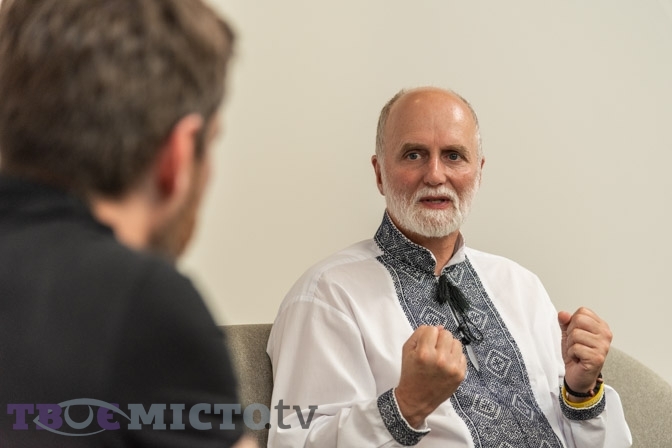
Sometimes it seems to us that the war can last a very long time. And someone looks for comfort in bloggers who say that it will be easier in the future, that some super weapon will appear that will solve everything. How do you set yourself up for the long haul, knowing that it will be a very tough road? How to avoid exhaustion, fatigue, despair?
It seems to me that there are many dangers, temptations, stumbling blocks, and I want to share what has become very important to me. I have an Italian acquaintance, she is a theologian, close to Ukrainian topics. And when she saw how brutal Russia’s aggression was, she said: «Take care of your heart.» This has become a slogan for me, which contains what I have repeatedly suggested, even publicly: not to allow the devil, the enemy of the human race, to get into our hearts.
Now the devil wants to weaken Ukrainians. The worst thing that can happen to us is if Putin is in our thoughts, feelings, soul, and heart. We need to be free. Metropolitan Andrey Sheptytskyi is known, but few people talk about Klymentiy. Klymentiy Sheptytskyi was a count, politician, economist, lawyer, an elegant man who was examined by older ladies with the hope that he would become their son-in-law. And suddenly he became a monk, and lived in Univ with village boys in a monastic community. He went «down», but his trajectory went much deeper, from a human point of view – into the pit, into the darkness. He ended up in Volodymyr prison in the 40s in solitary confinement, where he died. And Bishop Teodor Martyniuk went to Ternopil in the 90s to look for traces of his historical brother.
He met a woman who, as a girl, had the task of delivering food to prisoners. And she remembered a man with a beard, isolated in a cell with a small window. When she brought food, he was calm, smiling and looking somewhere. A girl from Stalin’s time and a Soviet upbringing could not understand that Klimentiy was praying. Everything was taken from him, his history was crossed out, there is no future, he will give up his spirit in this cell, but he had peace, he kept his heart.
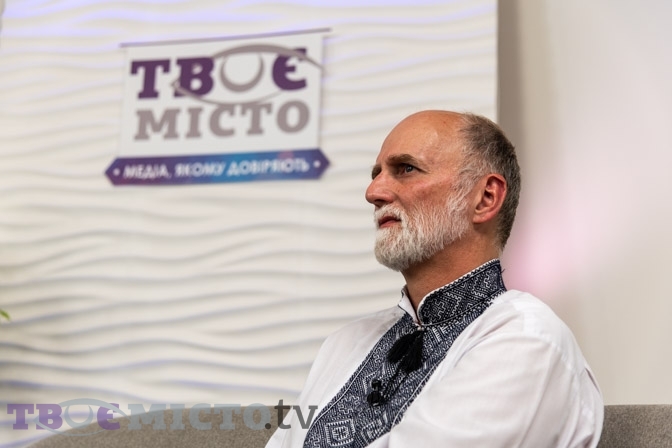
Researching the fates of thousands of representatives of the underground Church, I understood the main thing – there are no circumstances in which, with God’s help, we cannot live spiritually. We cannot do it ourselves, we need God’s grace for this. These are superhuman feats and experiences, but God wants us to live freely and with dignity. This can be transferred to everyday things: there are problems in the family, sometimes it is most painful when there is aggression in the family. But we are called to preserve our dignity.
We are currently on a pilgrimage from fear to dignity. And in this pilgrimage, we realize our dignity, we want to ensure it. Therefore, now, with a very long way to go, we must keep peace in our hearts. For this we must ask for God’s grace.
At the beginning of the conversation, you said that the example of the Ukrainians is an example for the whole world, and for Europe in particular, to remember something that has been somewhat forgotten. Krzysztof Zanussi, a Polish director who is also a Catholic thinker, writes in his latest book that we talk a lot about tolerance these days, but we forget that tolerance is only tolerating someone, while it is much more important to love someone. On a broader scale, Ukraine measures itself by European values - «are we Europeans yet?». We are asked «are you European?» and we answer «yes, we are European!». We are fighting for it, but the question is, is this crisis in which the world was before the war, a crisis of liberalism, as it is called, or is it that the West has forgotten the foundations of these values, that they grew inextricably from Christianity? The question is, is it possible to completely secularize liberal values and Christianity?
Krzysztof Zanussi is a friend of UCU, he was a member of our senate and our supervisory board, he gave us good advice at key moments and support Zanussi is right about the issue of tolerance and love, and in his thoughts about modern Europe.
You know, it is good to have fruit on a tree if you cut its roots. Not everything in Christianity was perfect, not everything in European church history is according to the teachings of Christ. We see that there were, are and will be many problems, because we are people, and people have their limitations, but what people see now in Ukraine is a denial of the worldview trends of the Western world. The Western world has a big problem making sense of death. It is a world that excludes God and excludes eternity. It reduces a person to biopsychological characteristics, which disappear when the body ceases to function.
It seems to me that the best sides of European civilization, and not only European, are built on the awareness of eternity. It is not just the idea of a fix that allows us to deal with unpleasant things, an illusion that we instrumentalize to deny reality. No, Christians believe in eternal life, and it would be interesting to get into the minds of those who give their lives for Ukraine. It seems to me that there is some deep spiritual principle there.
Our UCU community has already said goodbye to three graduates. The last were the funerals of Artemiy Dymyd and Oleh Vorobyov. These were people who bathed in an evangelical environment, and this does not mean that someone went to church every day, but in consciousness, in identity, there was an understanding that there is a Lord and a spiritual dimension, and in that context you can give your life. That is, it was not only a crossing out: my death is not a crossing out. It seems to me that this is exactly what surprises the world the most.
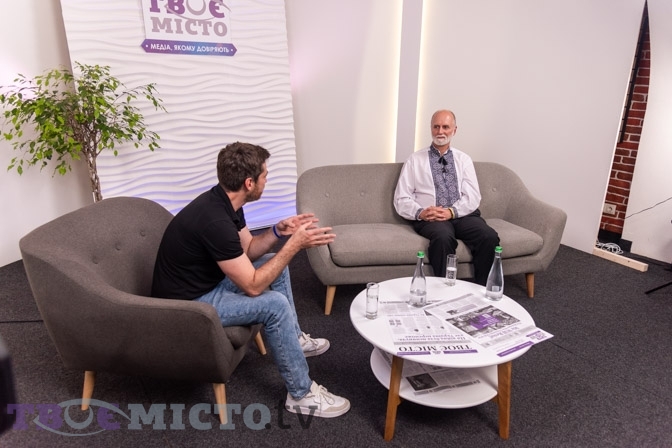
A world that has doubted or crossed out eternity sees people who, with eternity in mind, live and give their lives. I have yet to meet a single person who is willing to give up and retreat, to accept this terrible reality because of the price we are paying in this war. Maybe they are, but in general even people who have already lost a lot say «no, we have no other way out, moral, even existential way out.» And we go forward. It is a position of values, faith, hope, maybe there is a dose of fear, but it is also a position of great courage, and I believe that the Lord will bless these sacrifices.
It is very important that we do not taint them with a lack of unity, that we maintain a high moral bar. Let’s pray for it, let’s work on it! I am very grateful to Ukrainians and Ukraine for this attitude, for this work and for this faith, because today it is not only needed by Ukrainians, it is needed by the whole world.
Andrii Saichuk spoke
The text was prepared by Liana Abramova, translated by Vitalii Holich
Photo: Tvoe Misto/Ivan Stanislavskyi
Full or partial republication of the text without the written consent of the editorial office is prohibited and is considered a copyright violation.
Follow us on Facebook and Instagram. Lviv Now is an English-language website for Lviv, Ukraine’s «tech-friendly cultural hub.» It is produced by Tvoe Misto («Your City») media-hub, which also hosts regular problem-solving public forums to benefit the city and its people.


